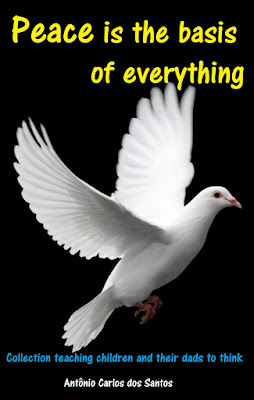Uma Coruja e um ursinho panda adoram promover discussões
sobre como melhor aprender a pensar.
No livro “O pequeno panda Zen”, os dois personagens aprendem
a organizar as coisas que estão na cabeça.
É assim que o pequeno urso ensina à coruja:
“(...) Para aprender, temos que nos livrar de muitas coisas
que estão embaralhadas na nossa mente. É tanta coisa que impede que o novo
adentre. Significa dizer que temos que ter a mente aberta, porque todo dia é
dia de aprender algo novo e inspirador (...)”.
Para saber mais sobre o livro, clique aqui.
A “Coleção ensinandoas crianças e seus papais a pensar” compõe-se de 10 livros.
Todos eles apresentam estórias singelas e inspiradores elaboradas para possibilitar a comunhão entre pais e filhos.
De forma lúdica, cada livro apresenta uma narrativa onde se destacam divertidos ensinamentos. São lições baseadas na filosofia que interage meditação e conduta. Mas não qualquer contemplação mental e qualquer ação, e sim a meditação e a conduta que se ancoram na reflexão crítica.
Como lidar com os problemas, dos mais simples e ordinários - que emergem no dia a dia - aos mais graves e complexos? Mais que isso, como processá-los sem perder de vista a criatividade e a racionalidade, colocando na mesma balança princípios e valores, autoestima e coletividade, respeito às diferenças e tolerância, fraternidade e solidariedade.
A necessidade de manter as emoções em estado de equilíbrio, o estímulo à curiosidade e à investigação, o encorajamento aos questionamentos sucessivos, a importância de dar relevância também à educação informal, o desenvolvimento de habilidades que possibilitem descontruir o pensamento para reconstruí-lo em novas bases, são alguns dos insumos explorados nos livros da Coleção.
Como pensar melhor? A felicidade não estaria nas pequenas coisas que se apresentam enoveladas no cotidiano? E quanto à justiça, aos princípios democráticos e aos valores éticos, não seriam os pilares de sustentação do homem virtuoso? São questionamentos que o autor desenvolveu e que estruturam os cenários presentes nas estórias, um espaço privilegiado onde pais e filhos – através das leituras e discussões - aprenderão uns com os outros.
Cada criança é um ser único e especial. Esta é a referência dos 10 livros da coletânea:
Livro 1. O pequeno panda zen
Livro 2. O pequeno sapo zen
Livro 3. É melhor pensar antes de falar
Livro 4. Os desafios são necessários
Livro 5. A paz é a base de tudo
Livro 6. A gentileza pode tudo
Livro 7. O segredo da felicidade
Livro 8. A mulher bela e rica e sua irmã feia e pobre
Livro 9. O pequeno gato zen
Livro 10. O pequeno cachorro zen
Para saber mais sobre a coleção, clique aqui.
O AUTOR:
No buscador do site amazon.com.br, digite “Antônio Carlos dos Santos” e acesse dezenas de obras do autor.
Veja, logo abaixo, os dez livros da coleção:
 |
| Para saber mais sobre o livro, clique aqui. |
 |
| Para saber mais sobre o livro, clique aqui. |
 |
| Para saber mais sobre o livro, clique aqui. |
 |
| Para saber mais sobre o livro, clique aqui. |
 |
| Para saber mais sobre o livro, clique aqui. |
 |
| Para saber mais sobre o livro, clique aqui. |
 |
| Para saber mais sobre o livro, clique aqui. |
 |
| Para saber mais sobre o livro, clique aqui. |
 |
| Para saber mais sobre o livro, clique aqui. |
 |
| Para saber mais sobre o livro, clique aqui. |













